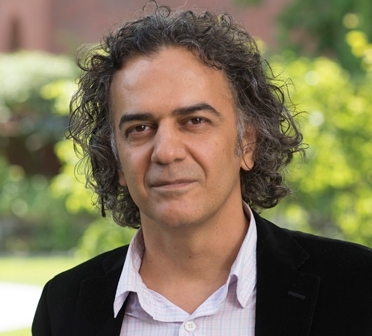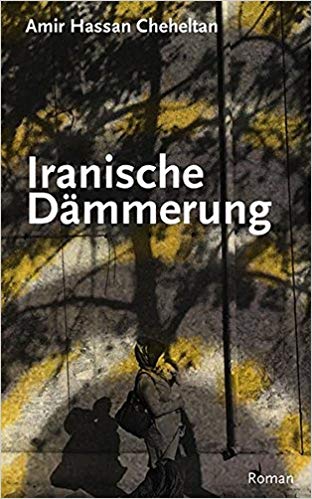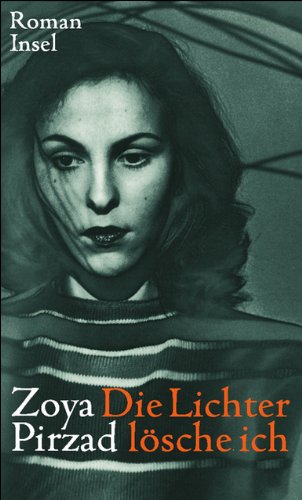Reading outside the box

Iran is once again in the headlines in Western media. The usual topics can be found: Iranian-American disputes, the nuclear conflict, police violence against demonstrators, religious fanaticism, and so on. It goes without saying of course that all these things are only a small part of what Iran and Iranians are concerned with in everyday life, but it is nonetheless something that should be kept in mind in order not to succumb to a distorted image.
If you really want to understand a country, or at least to try to understand it better, you can't avoid one thing: literature. In the case of Iran, this is of course not so easy if you do not speak the Persian language, because the translations available are sparse. This is unfortunate, especially in the case of Iran, a country that can look back on a literary tradition that is thousands of years old. From Hafez to today – there are still many treasures to be found. Poems, short stories, novels. We will focus on the latter here.
A tale of heroes and martyrs

The Iran-Iraq war (1980–88) still dominates the narratives of Iranian domestic politics. The story is that of a country that, immediately after the turmoil of the Islamic Revolution, stands together against an external aggressor. A story of heroes and martyrs, after whom countless streets are named today.
There are war museums and martyr memorials, there are songs, films and books looking back on that time. Most of them have one thing in common: they tell a propaganda story.
The writer Hossein Mortezaeian Abkenar went against the grain of this narrative in his debut novel "A Scorpion on the Steps of Andimeshk Railroad Station" from 2006 (German translation by Kurt Scharf, Kirchheim Verlag 2013). For the author there are no war heroes, only losers.
Shortly before his release from the army, he looks back on the blood, misery, death, mountains of corpses and killing. He remembers his sympathy for the Iraqi soldiers and that on the battlefield it doesn't matter which side you're on. The protagonist and his comrades do not want to become martyrs. They are desperate and distraught. All they want is to stay alive.
Abkenar tells of his own experiences here. He was a young solder at the front. The content of his book is as disturbing as it is fascinating and ambitious. By constantly changing the narrative perspective, switching between first and third person, and sometimes reproducing gruelling streams of thought completely without punctuation, Abkenar formally mirrors his characters' inner turmoil.
There is no happy end, and the Scorpion leaves behind nothing that could be used to promote national unification.
Dubious honour for Cheheltan's novel
Amir Hassan Cheheltan's novel "Iranian Dawn" (German translation by Jutta Himmelreich and Farsin Banki, Kirchheim Verlag 2015), on the other hand, was even recognised as the Book of the Year by the Iranian Ministry of Culture in 2007 – but only after the censors excised large passages. The German edition is the only complete edition to date.

When Cheheltan tried to refuse the dubious honour, the ministry insisted that he could not refuse the award because it was for the book, not the author. "Iranian Dawn" brings home the enduring complexity and controversial nature of this revolution, which created a regime that has now been rejected by four-fifths of the population, according to a parliamentary study conducted a few years ago.
In 1979, Cheheltan's protagonist Iraj returns to Tehran after 28 years away. He is looking for his country's new dawn after the abdication of the Shah regime, but all he finds is a gloomy dusk before another long night. The peaceful atmosphere of his childhood has vanished, just like the streets, which he no longer recognises.
His relationships with his wife and father are broken beyond repair. His shattered private life reflects the condition of his country, which careens from one nightmare to the next. It is an oppressive panorama of hopelessness, in which politics pervade the lives of the protagonists so deeply that all of their personal life plans are doomed to fail.
Selective criteria
Based on these three examples, it might appear that war and revolution are dominant themes in contemporary Iranian literature, but that's not the case, although they certainly play a major role. Sometimes, however, the seemingly narrow selection of themes has more to do with the criteria according to which publishers select books for translation.
In the past twenty years, numerous authors have devoted themselves to completely different subjects. Modern Iranian literature is shaped by women. The authors Fariba Vafi, Zoya Pirzad and Sara Salar all write books that are bestsellers in Iran.
Fariba Vafi's novels, three of which have German editions so far, are delicate, linguistically sophisticated gems. Hardly any other author has so perfectly mastered the art of looking behind the scenes of everyday life in Iran.
At the core of her stories is the family and mostly young women whose wishes and dreams do not differ so much from those of their peers in the West, but who have one thing in common: their ambitions fail due to social and family expectations, economic constraints and the narrowness of the political system, which always has an impact on the private sphere.
Vafi skilfully bypasses the mechanisms of censorship by letting all critical issues smoulder just below the surface, though still impossible to overlook. This is the case with Scholeh, for example, the protagonist of her latest novel with the distinctive title "The Dream of Tibet" (German translation by Jutta Himmelreich, Sujet Verlag 2018). Her uncle Sadegh has just been released from prison, and the context and certain hints make it clear that he was imprisoned for political reasons. Sadegh just wants to get away, seeing no future for himself in Iran. Scholeh becomes increasingly withdrawn as she observes the desolate expressions on the faces all around her
The "Iranian Madame Bovary"

The Neue Zuricher Zeitung called Zoya Pirzad's hugely successful novel "I Will Turn off the Lights" (German translation by Susanne Baghestani, Insel Verlag 2006) the "Iranian Madame Bovary". The story by the Armenian-Iranian author takes place in the 1960s, in the Shah era, but between the lines also reflects the present state of mind. Protagonist Clarisse is in her late thirties when, worn out by household chores and taking care of the children, she wonders when she has ever done anything for herself.
She is only marginally interested in the political ambitions of her left-leaning husband, which sometimes worry her, although their relationship is pretty much dead anyway. Soon she makes the acquaintance of a new neighbour, whom she instantly gets along with. If only it weren't for her over-protective mother with her endless concerns.
"I Will Turn off the Lights" is an easy-going and by turns funny and melancholy novel about interpersonal relationships, midlife crises, and the ups and downs of everyday life in the Armenian-Christian milieu of the Iranian city of Abadan – as far removed from the capital's affairs as can be.
In the chaos of Tehran
Broken relationships are also the subject of Sara Salar's novel “I'm Probably Lost” (German translation by Jutta Himmelreich, Kirchheim Verlag 2014), which was hugely successful at first and was then banned. In the middle of the chaotic traffic of Tehran, the protagonist, who has just picked up her little son, has an identity crisis.
She begins to question all of her life choices. Did she marry the right man? Was having a child the right decision? Wasn't her long-lost friend Gandom, whose voice haunts her thoughts, always right in all of her criticisms? Can the psychiatrist actually help her, or is she just wasting her time?
All these questions, this inner unrest and dissatisfaction, send her hurtling into an outbreak of self-determination – something that is still often taboo for women in Iran today. To rebel against husband, family and society, even if only in small details. Salar's novel is captivating, the voice of her main character as lifelike as if you had known her for a long time, as if you were sitting next to her in the car. Her voice becomes a symbol of a life that has hit a dead-end and cannot continue in its long-suffering meekness.
Speaking of continuing: These six novels, these six very different literary voices are merely a start; an entree. They can open doors for all those who are interested in contemporary Iranian literature and who want to get to know the country beyond all the agitated headlines.
Gerrit Wustmann
© Qantara.de 2020
Translated from the German by Jennifer Taylor
